Caloric Content of Apples and Their Health Benefits
Table of Contents
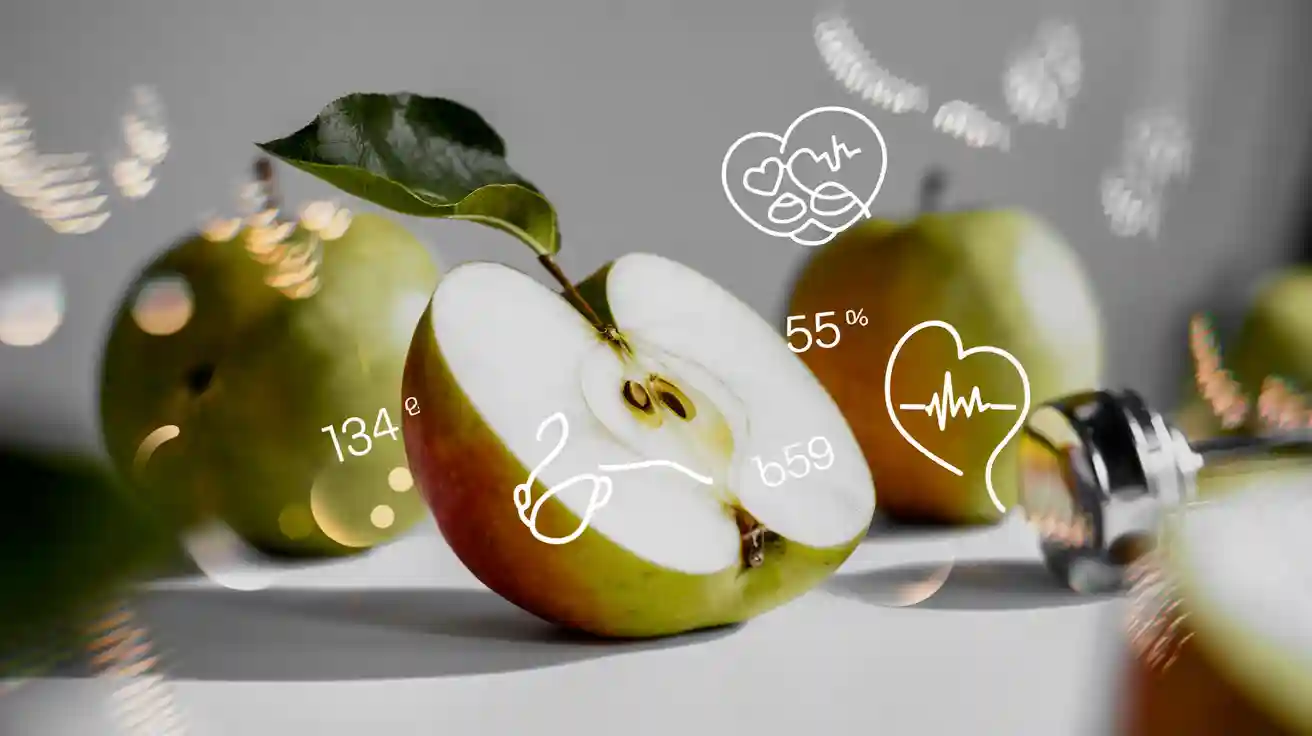
When you ask how many calories in an apple, the answer depends on size and type. A medium apple has about 100 calories, while different varieties show some variation. See how the number of calories in an apple compares in the tables and chart below:
| Size | Calories |
|---|---|
| Small | N/A |
| Medium | 100 |
| Large | N/A |
| Apple Variety | Calories (kcal) | Weight (g) | Taste |
|---|---|---|---|
| McIntosh | 80 | 150 | Sweet, tart, tangy |
| Pink Lady | 71 | 133 | Sweet, tart, juicy |
| Red Delicious | 125 | 212 | Mild, sweet |
| Egremont Russet | 80 | 150 | Nutty, slightly dry |
| SweeTango | 95 | 182 | Sweet, juicy |
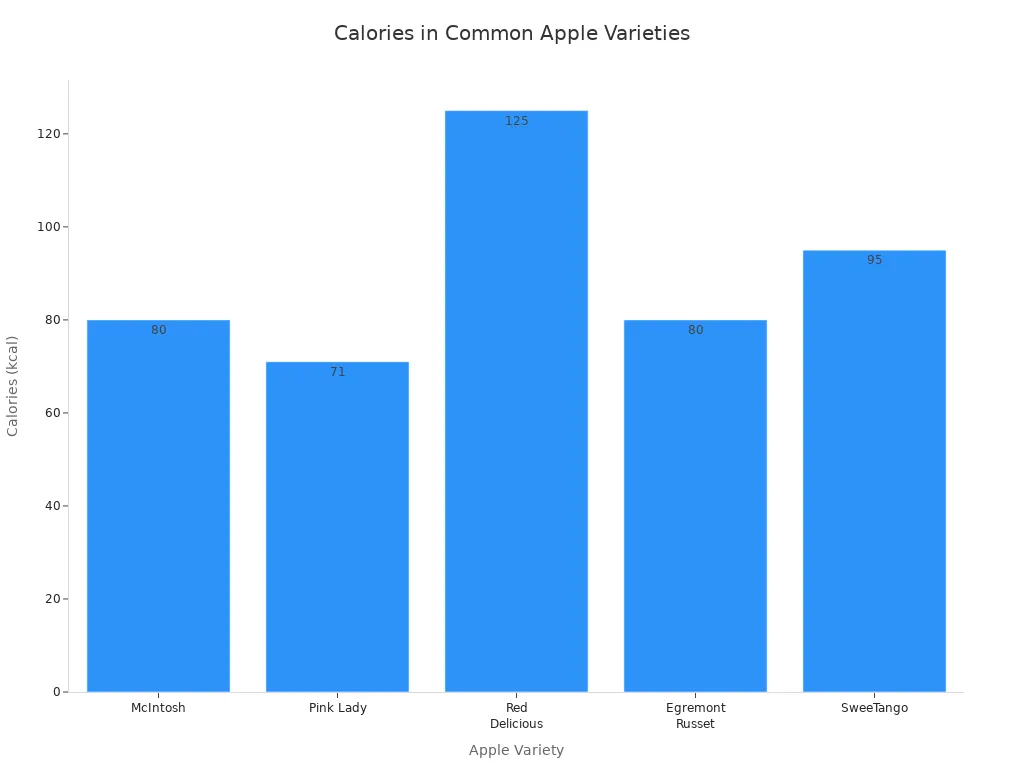
You might notice apples are low in calories, high in fiber, and full of nutrients. If you wonder how many calories are in 1 apple, you usually get 95 to 100 calories. The number of calories in an apple also varies by variety and size. When you look for how many calories are in 1 apple, you see apples fit well into healthy diets. If you want to know how many calories in an apple, use the Caloric Content of Apples as your guide.
Caloric Content of Apples

How Many Calories in an Apple
When you pick up an apple, you might wonder how many calories it contains. The answer depends on the size and type of apple you choose. Most medium apples, about 3 inches in diameter, have around 95 calories. If you weigh your apple, a medium one (about 182 grams) usually has close to 100 calories.
- A medium apple (3-inch diameter): about 95 calories
- A medium apple (182 grams): about 100 calories
You can see that the calories in an apple stay low, making apples a smart snack for anyone watching their calorie intake. The caloric content of apples makes them easy to fit into your daily diet.
Calories in an Apple by Size and Variety
The calories in an apple change with its size. Here is a simple table to help you compare:
| Apple Size | Calories |
|---|---|
| Small | 60–65 |
| Medium | 90–95 |
| Large | 115–120 |
Some sources show small apples (about 149-150 grams) have 77-80 calories, medium apples (182 grams) have 95 calories, and large apples (223-225 grams) have 116-126 calories. You can see that the caloric content of apples increases as the apple gets bigger.
The calories in an apple also depend on the variety. Different types of apples have different sugar and fiber levels, which affect their calorie count. Here is a table showing the calories in some popular apple varieties:
| Apple Variety | Calorie Count (per medium apple) |
|---|---|
| Granny Smith | 80 |
| Gala | 70-80 |
| Fuji | 80-90 |
You might notice that Gala apples have fewer calories than Fuji apples. Granny Smith apples also have a lower calorie count. The caloric content of apples can change based on the type you pick.
Many factors affect the calories in an apple. These include:
- Apple variety: Each type has a unique mix of sugar and fiber.
- Size of the apple: Bigger apples have more calories.
- Ripeness: Riper apples may have more sugar, which can raise the calorie count.
- Water content: Apples grown in wetter seasons may have more water and fewer calories per bite.
- Sugar levels: Cooler fall weather can make apples sweeter and slightly higher in calories.
- Harvest timing: Apples picked later in the season may have a different nutritional profile.
Tip: If you want to keep your snack low in calories, choose a small or medium apple and eat it fresh. The caloric content of apples makes them a great choice for a healthy diet.
The calories in an apple are low compared to many other snacks. You can enjoy apples every day without worrying about the calories of an apple. The caloric content of apples stays consistent, so you can plan your meals with confidence. Apples offer a sweet taste, fiber, and nutrients, all for a small calorie cost.
Apple Nutrition Facts and Health Benefits
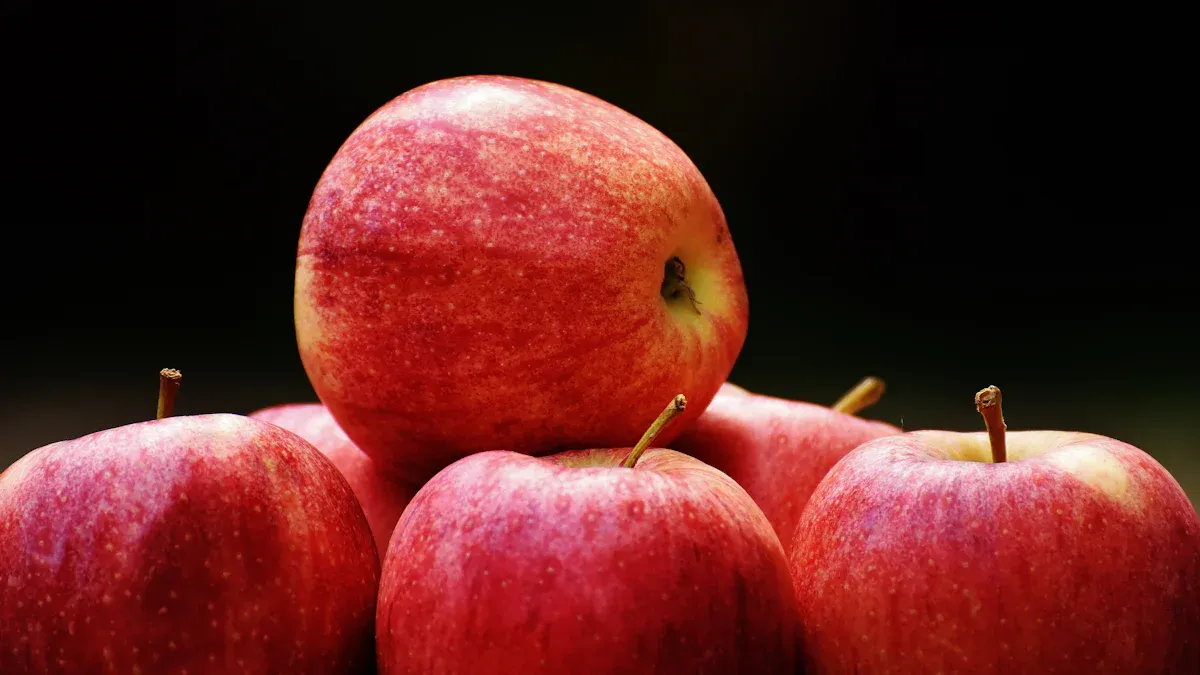
Apple Nutrition Facts
You might wonder about the nutritional profile of an apple. A medium apple gives you a lot of water, fiber, and vitamin C. Here is a quick look at apple nutrition facts:
| Nutrient | per medium apple (150g) |
|---|---|
| Water (g) | 129 |
| Total Sugars (g) | 17.4 |
| Fibre (g) | 1.8 |
| Vitamin C (mg) | 9 |
A medium apple provides about 4 grams of fiber, which is 15-20% of your daily needs. Apples are high in fibre and help you feel full. You also get about 8% of your daily vitamin C and 7% of your potassium needs. Apples have less sugar than mangoes and bananas.
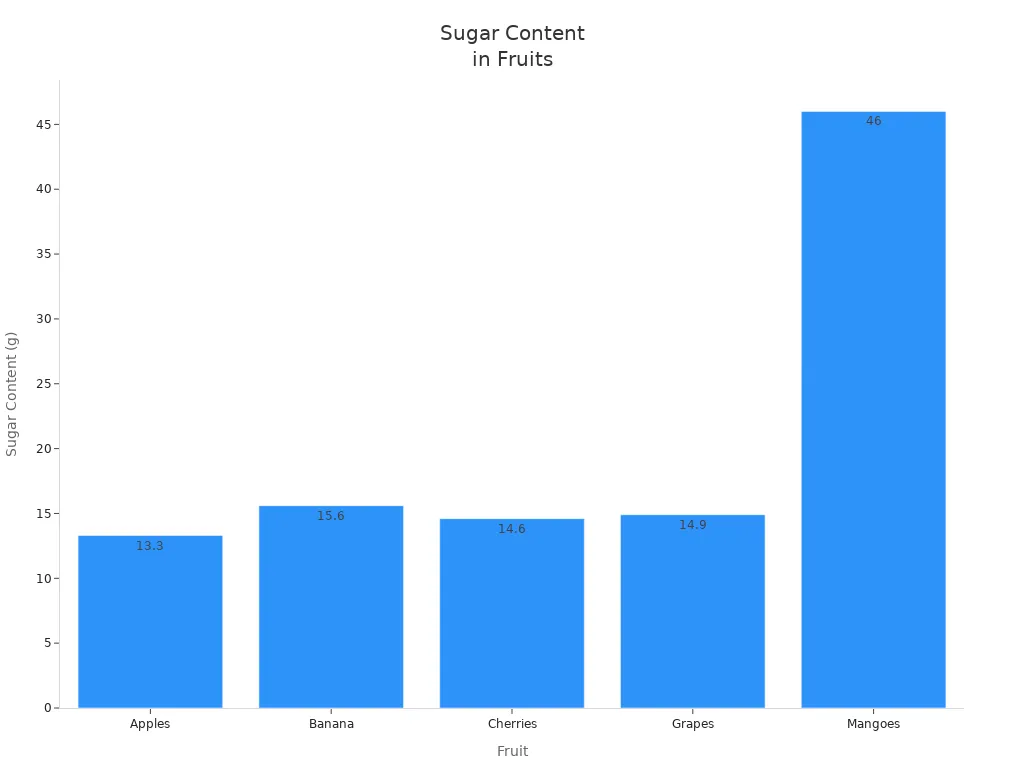
Health Benefits of Apples
The benefits of eating apples go far beyond taste. When you eat an apple a day, you support your heart, digestion, and immune system. Apples help lower cholesterol, reduce blood pressure, and ease inflammation. The high in fibre content helps with weight loss by keeping you full. Studies show eating apples can lower your risk of diabetes and help with weight loss. Apples also support gut health and may prevent constipation. The health benefits of apples include better hydration and a stronger immune system.
Potential Risks
Most people enjoy the benefits of eating apples, but some may notice mild issues. Eating apples can cause bloating or gas, especially if you have IBS. Too much fiber may lead to diarrhea. Apples contain natural sugar, so if you have diabetes, watch your intake. Rarely, people with fruit allergies may react to apples.
Practical Tips for Eating Apples
You can add apples to your diet in many ways. Try fresh apples as a snack, blend them in smoothies, or slice them into salads. Use apples in oatmeal, sandwiches, or even savory dishes like pork chops. Bake apples with cinnamon for a healthy treat. Choose recipes that keep apples whole and avoid extra sugar. Eating apples with the skin gives you the most benefits of eating apples and helps with weight loss. The nutritional profile of apples makes them a smart choice for every meal.
You can enjoy apples as a healthy snack. Check the table below for calories in different apples:
| Apple Size/Variety | Approximate Calories |
|---|---|
| Small (149-150g) | 77-80 |
| Medium (182g) | 95 |
| Large (223-225g) | 116-126 |
| Granny Smith (medium) | 80 |
| Gala (medium) | 70-80 |
| Fuji (medium) | 80-90 |
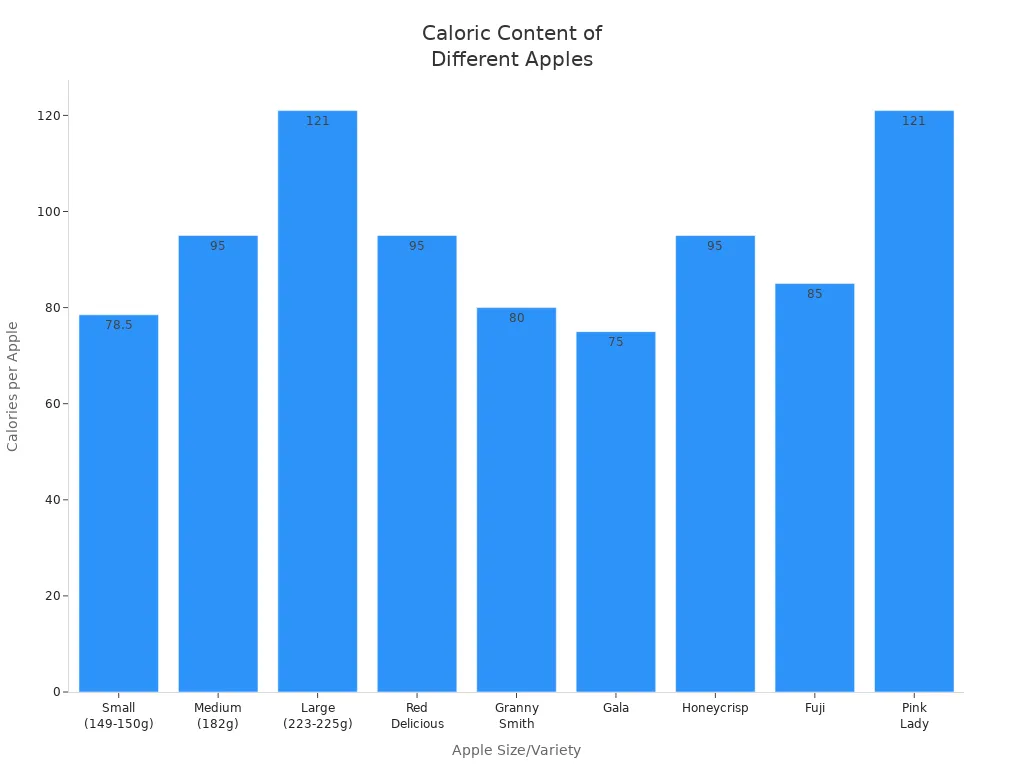
- Apples give you fiber and vitamin C.
- They help your gut and heart.
- You get few calories and no fat.
Add apples to your meals for a tasty, smart choice every day.
FAQ
How many apples should you eat each day?
You can eat one to two apples each day. Apples give you fiber, vitamins, and water. Eating apples helps you feel full and supports your health.
Do apples help with weight loss?
Apples help with weight loss because apples have fiber. Apples make you feel full. You can eat apples as a snack instead of chips or cookies.
Can you eat apples if you have diabetes?
You can eat apples if you have diabetes. Apples have natural sugar, but apples also have fiber. Apples do not cause big spikes in blood sugar.
Tip: Wash apples before you eat apples. Apples may have pesticides or dirt on the skin. Eating clean apples keeps you safe.
- Apples are easy to carry.
- Apples taste sweet or tart.
- Apples come in many colors.
| Apple Color | Taste |
|---|---|
| Red | Sweet |
| Green | Tart |
| Yellow | Mild |
Apples grow in orchards. Apples ripen in fall. You can pick apples or buy apples at stores. Apples stay fresh for weeks if you keep apples cool.
Apples have vitamin C. Apples help your immune system. Apples support heart health. Apples help your digestion. Apples give you energy. Apples have little fat. Apples have no cholesterol. Apples are low in calories. Apples are good for snacks. Apples are good in salads. Apples are good in pies. Apples are good in smoothies. Apples are good in oatmeal. Apples are good for kids. Apples are good for adults. Apples are good for athletes. Apples are good for students. Apples are good for seniors. Apples are good for everyone.
You can eat apples raw. You can bake apples. You can cook apples. You can dry apples. You can make applesauce. You can make apple juice. You can make apple cider. You can slice apples. You can dip apples in peanut butter. You can add apples to yogurt. You can add apples to cereal. You can add apples to pancakes. You can add apples to muffins. You can add apples to salads. You can add apples to sandwiches. You can add apples to wraps. You can add apples to desserts. You can add apples to savory dishes.
Apples are safe for most people. Apples may cause gas if you eat many apples. Apples may cause allergies in rare cases. Apples are healthy for most diets.

Poseidon
Master of Nutritional Epidemiology, University of Copenhagen, Herbal Functional Nutrition Researcher
Focus: The scientific application of natural active ingredients such as Tongo Ali, Horny Goat Weed, and Maca to sexual health and metabolic regulation.
Core Focus:
Men: Use a combination of Tongo Ali (an energizing factor) + Maca (an energy reserve) to improve low energy and fluctuating libido.
Women: Use a combination of Horny Goat Weed (a gentle regulator) + Maca (a nutritional synergist) to alleviate low libido and hormonal imbalances.
Stressed/Middle-Aged Adults: This triple-ingredient synergy supports metabolism, physical strength, and intimacy.
Product Concept:
Based on traditional applications and modern research (e.g., Tongo Ali promotes testosterone-enhancing enzyme activity, and icariin provides gentle regulation), we preserve core active ingredients and eschew conceptual packaging—using natural ingredients to address specific needs.
Simply put: I'm a nutritionist who understands "herbal actives." I use scientifically proven ingredients like Tongo Ali, Epimedium, and Maca to help you make "sexual health" and "nutritional support" a daily routine.
